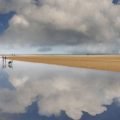
Henry Williamson, the author of Tarka the Otter, loved the abundance and variety of living creatures in this countryside, and for seven years he lived and farmed five miles along the coast at Stiffkey. When Dudley returned home after tea, this is where I went, pitching my tent in a field that was once part of a wartime RAF camp, overlooking thousands of acres of wild saltmarsh, and Cabbage Creek. It is easy to get lost in this watery maze, and find yourself marooned on a rising tide.
From 1937, Williamson farmed 235 acres here, struggling to bring the derelict farmland back into good heart at Old Hall Farm. He recorded his day-to-day adventures in The Story of a Norfolk Farm, and in a regular column in the Evening Standard which ran all through 1944 and ’45, under the title ‘A Breath of Country Air’. He always left writing the column until the last possible moment, and his two little boys would be waiting in the kitchen, re-tying the laces of their plimsolls ready for the sprint up Stiffkey street to the post van at half past four. The poet of Tarka bathed with his children in the warm water of the marsh pools, often by moonlight, after as much as twelve hours’ prickly work in the harvest fields.
At dimmit-light, or dimsey, as they called twilight on Tarka’s River Taw in Devon (where Williamson lived before and after Stiffkey), I went out over Stiffkey Marshes and swam in the Stiffkey Freshes. A deep pink moon rose up over Blakeney Point, whose bleached pebbles shone from across the water. Although I couldn’t see them, I knew there were seals not far away on its outer beaches. A line of small boats rode at their moorings out in Blakeney harbour.
I felt the tide running in as I entered the sea. It advanced at astonishing speed, gaining three or four feet each minute, spilling over the almost level muddy sands in a rolling three-mile meniscus that stretched unbroken all the way west to Wells. The water was warming itself as it inched up the wandering guts and channels where the sun had beaten all day. It was calmed by the sheltering arm of the great shingle bank opposite. I floated out into the freshes, the water beyond the marsh, through bands of seaweed, letting myself drift with the tide along the strand towards the mouth of the Stiffkey River, where there were houseboats, half-hidden in the winding creeks, shuttered, silent and dark against the moon. I listened to the sea percolating into the marsh, sliding up every little meandering mud canyon, between the glidders and uvvers – the mud banks – trickling about the mycelium of creeks, gently rocking the glistening samphire. Even the tiniest channels in the mud or sand mimicked the patterns and movement of a great river.
As I bathed, I imagined Williamson, now an otter himself, swimming at dusk with nine children in one of the marsh pools, with the reflected wing-tip lights and the roar of the warplanes returning to the airfield behind Stiffkey. Then the air would be quiet again, as it was now, except for the cries and splashings of the children, and the marsh birds. The girls’ clothes, draped over sea lavender, might well have included blouses or aprons of a fine red cotton, then the fashion in Stiffkey, because the ‘mashes’ were a popular children’s hunting-ground for the much-prized scraps of the red drogue parachute targets, which were towed to and fro all day by aeroplanes, while gunners practised, filling the wide sky with black puffs of smoke.
When Williamson died, it was Ted Hughes who delivered the memorial address at the service of thanksgiving in St Martin-in-the-Fields. Hughes had found and read Tarka at the age of eleven and counted it one of the great pieces of good fortune in his life. For the next year he read little else. ‘It entered into me,’ he said, ‘and gave shape and words to my world as no book ever has done since. I recognised even then, I suppose, that it is something of a holy book, a soul-book, written with the life-blood of an unusual poet.’ Hughes regarded Williamson as ‘one of the truest English poets of his generation’, although he never published a word of verse. Tarka had taken four years to write, and went through seventeen drafts. Williamson rewrote Chapter Eleven, which begins at the source of five rivers up on Dartmoor, thirty-seven times. He described the writing of those paragraphs to Hughes as ‘chipping every word off the breastbone’. The two men became friends when Hughes, not much over thirty, and still spellbound by the magical book, found himself living in the middle of Devon on the Taw not far from where Williamson, now in his sixties and also still under Tarka’s spell, was working in a hut on a patch of land he had bought with the prize-money his book had won him long ago. (He had sold the Norfolk farm by the end of 1945, his dreams unrealised.)
I have always admired Williamson, not only for the beauty and ice-clear accuracy of his writing, but for the moral basis of his vision, which sprang from the natural world and his passionate concern to take care of it. In this, he was far ahead of most of his contemporaries. Hughes described Williamson at that service of mourning as ‘a North American Indian dreamer among Englishmen’.
When I came out of the water, my shadow fell twenty feet along the shell-strewn shoreline. The moon was rising towards a thin band of mackerel cloud, and terns, duck and wading birds called to one another all over the marsh. Nothing much had changed since Williamson was here, driving his grey Ferguson tractor in a mackintosh tied up with baling twine, building his wooden tide-doors to keep the river from flooding his fields, and trapping eels in his ditches.







